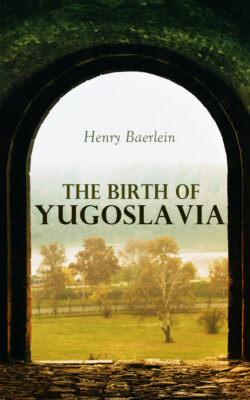Читать книгу The Birth of Yugoslavia - Henry Baerlein - Страница 24
На сайте Литреса книга снята с продажи.
GATHERING DARKNESS
ОглавлениеFor a few years after Kossovo the Serbs resisted; but their efforts, now at Belgrade, which was made the capital and fortified by Stephen the chivalrous son of Prince Lazar, now at Smederevo on the Danube, were spasmodic. Bands of Turks and also of Magyars were terrorizing the country; and the sagacious old despot George Branković was the last to offer opposition to the Turk at Smederevo. Meanwhile in Bosnia, the Bogomiles, driven to despair by persecution, had been calling to the Turk. Constantinople fell in 1453, Serbia laid down her arms in 1459, while in 1463 Muhammed ii. appeared before Jajce, Bosnia's capital, where one can still see the skeleton of Stephen Tomažević, the last king, who was executed by the Sultan's order. And now in this land of heresy, which had become so hostile to the established Churches, hundreds of those who professed the Bogomile faith went over eagerly to Islam; they hoped that in this way they would triumph at the expense of their late persecutors. Those who had worldly possessions were the first to embrace Islam, in order to safeguard them. Those who had neither wealth nor much accumulated hatred remained Christians. One would expect that people who had adopted a religion under these impulses would be even more uncompromising than the usual convert, and indeed, as a general rule, the ex-Christian begs and aghas displayed until recent times not only a more than Turkish observance of the outward forms of Islam but a tyranny over the wretched raias, their slaves, that was much more than Turkish.
Fortune had turned her back upon the Southern Slavs. In the north the Slovenes were imprisoned in the Holy Roman Empire, while the Croats—save for the time when they were under Tvertko—had a succession of alien rulers, such as the aforementioned Ladislas, whom they naturally disliked.
After Kossovo some of the Serbian nobles had fled to Hungary, to Bosnia and to Montenegro. It was among the almost inaccessible, bleak rocks of Montenegro that a few thousand Serbs managed to retain their liberty. Various Serbian tribes or clans thus found a refuge, and owing to their isolation from each other they preserved their differences. They have, in fact, preserved them, as well as the tribal organization, down to the present day. And then there was Dubrovnik, the stalwart little republic. Now that she stood alone she needed all her acumen. Yet if she paid necessary tribute to the powerful, she would not give up helping the fallen. From this Catholic town in 1390, the following message was sent to the Serbian Prince Vuk Branković: "If—and God forbid that it should be so—Gospodin Vuk should not succeed in saving Serbia, and should be driven thence either by the Magyars or the Turks or anyone else, we will receive the Gospodin Vuk and the Gospodja Mara his wife, together with their children and their treasure, in all good faith in our city; and if Gospodin Vuk desire to build a church of his own faith here for his use, he shall be at liberty to do so."[19]
Darkness lay over the world of the Southern Slav—under the Turk there was no history. Generation followed generation, but the day of Kossovo does not seem to the Serbs as though it were a distant day. Do not we who go about our business in the brilliance of the morning sometimes linger to recall the frightful setting of the sun? And every year the Serbian people sing the Mass for the repose of them who died at Kossovo. … When, after more than five hundred years, the Serbian soldiers in the Balkan War came back to this historic plain one saw them halting, without being ordered to do so, crossing themselves and presenting arms.
